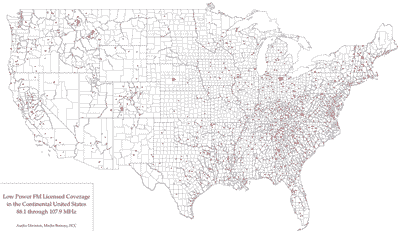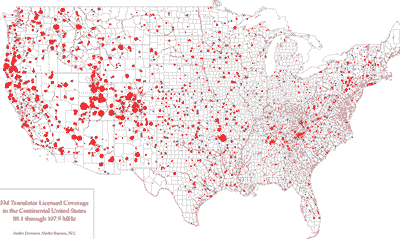My work online here will significantly slow down over the next couple of months, as I enter the most critical phase of my graduate studies to-date. Once I hopefully become ABD (“all but dissertation”) in early May, some of the pressure ease. But then I’m immediately leaving the country for an exploratory workshop hosted by the European Science Foundation on the impact of digitalization with regard to community media. As one a handful of non-EU “experts” invited to the event, I expect my role will primarily be to warn other countries in the midst of formulating, adopting, or modifying digital radio standards to stay as far away from iBiquity’s HD protocol as they possibly can.
Expect “regular” content-generation to resume sometime in late May or so. I made updates to the Schnazz, Truthful Translations, and Enforcement Action Database over the weekend, so those are up to date, at least in the near term.
In the meantime, keep an eye on these stories: Continue reading “Hiatus Ahoy: Notes While Away”
Category: LPFM
Microradio: As Pawn and Pain In the Ass
It’s hard to imagine that the FCC in 2007 would end the year with such a thud, but it has. With the promulgation of a rule effectively repealing the ban on newspaper/broadcast station cross-ownership – drafted in the dead of night, formally introduced in a newspaper op-ed, modified without consensus, and approved along partisan lines, with outright disdain for the 99.99% margin of public disapproval of both the practice and policy – Kevin Martin’s FCC has firmly put itself in the political cross-hairs.
A lawsuit to challenge the ruling is in the works, and members of Congress are yelping as their constituents call all pissed off (and rightly so); they’re pondering taking actions ranging from a “resolution of disapproval” of the FCC’s cross-ownership action, to a bill formally repealing the FCC’s decision, to a campaign to scrutinize and overhaul the FCC itself next year. The latter option would definitely be the most interesting to observe – anytime an agency goes into the legislative woodshed for restructuring, it’s going to disrupt business as usual. Regardless, this issue is far from finished, and still has the potential to undertake several dangerous iterations. Continue reading “Microradio: As Pawn and Pain In the Ass”
The FCC's Three Ring Circus
That’s what I get for taking a month-long hiatus: the FCC goes all P.T. Barnum on our ass, in hopes of making suckers of us all.
In the center ring is the agency’s proposed changes to media ownership regulations. After hinting that he wished to ram through major changes allowing broad consolidation by the end of the year, and hustling to finish public hearings on the subject over the last month, FCC Chairman Kevin Martin – in a highly unusual move – published his own proposal to modify only the regulation that restricts cross-ownership of newspapers and broadcast stations in a single market. Unfortunately, as noted by the minority Commissioners, this proposed change contains loopholes that would effectively do away with the cross-ownership ban, while keeping its regulatory shell on the books. This has irked members of Congress, many of whom are threatening to legislatively intervene if the FCC moves on any media ownership rule changes before the end of the year. Continue reading “The FCC's Three Ring Circus”
New LPFM Expansion Effort Launched in Congress
A coordinated introduction of bills in the House and Senate by bipartisan duos suggests the chance to rescind the Radio Broadcasting Preservation Act may be pretty good this year – but, as the Mediageek has already noted, prior Congressional history on this issue means there’s still a lot that must happen before any LPFM expansion becomes law.
There are several factors working both for and against the growth of LPFM. One is that telecommunications and media-regulation issues more generally are occupying a lot more of Congress’ time this session: several large debates related to broadband deployment and network operation, spectrum repurposement, possible corporate mergers (such as the proposed XM/Sirius marriage), and copyright/royalty regulation are already sucking a lot of political time and energy. Continue reading “New LPFM Expansion Effort Launched in Congress”
Congressional LPFM Expansion Play Afoot
Ever since Congress bowed to pressure from commercial and public broadcasters six years ago and severely gutted the low-power FM radio service, its advocates have been working the Hill looking for a way to nullify the intervention. Several tries at passing bills to directly reverse the damage died quietly, which has directed attention toward using the amendment process as a vehicle for progress.
The “Radio Broadcasting Preservation Act” only became law because it was attached to a spending measure. This maneuver is one of the most sneakily abused ways of routing corrupt legislation through the system. LPFM advocates, led by the Prometheus Radio Project, are at least working with an existing bill that specifically involves important communications regulation. Continue reading “Congressional LPFM Expansion Play Afoot”
FCC Maps Translator, LPFM Coverage
From the half-glass department: check this map of licensed LPFM station coverage in the continental United States (click for larger versions):

Now, a map of licensed FM translator station coverage:
 Continue reading “FCC Maps Translator, LPFM Coverage”
Continue reading “FCC Maps Translator, LPFM Coverage”
Translator Petition Attracts Scant Comment
A couple dozen folks filed comments in the FCC’s proposed rulemaking to allow FM translator stations to originate their own programming. Several of the commenters are long-time LPFM activists, and many of them support the proposal provided that a translator’s license status is not used to bump LPFM stations off the air, and that the FCC be diligent enough to prevent this type of abuse, especially in light of the speculation and trafficking in translator station construction permits that’s gone on in recent years. (Conspicuously missing from the initial comment round is LPFM’s largest institutional proponent, the Prometheus Radio Project.)
Other supporters of the proposal include local owners of single translator stations, who believe they could be used to replace full-power stations in smaller communities that have since been bought out by broadcast conglomerates and moved closer to larger markets (“rimshot” stations). Continue reading “Translator Petition Attracts Scant Comment”
LPFM Station Honored for Post-Katrina Broadcasts
Congratulations to WQRZ-LP in Kiln, Mississippi, honored last week for its heroic efforts following the area’s ravaging by Hurricane Katrina. WQRZ can be heard in Waveland, where temporary autonomous microradio also helped out during the storm’s immediate aftermath. Continue reading “LPFM Station Honored for Post-Katrina Broadcasts”
Unleashing Translators for Local Programming?
A small-town broadcast concern in Illinois has filed a petition for rulemaking with the FCC asking it to allow FM translator stations to originate local programming. The only substantive difference between a translator and an LPFM station is that the former can be up to two and a half times more powerful than the latter, though it is required to rebroadcast another source or station; LPFM stations are explicitly encouraged to be live and local.
![]() The petition, filed by the Miller Media Group of Taylorville, IL, owner of seven full-power AM and FM stations, would allow FM translators to broadcast original programming from any point located within 25 miles of its transmitter. It notes the “thousands of FM translator stations authorized, and many more thousands of translator applications awaiting FCC action. [These] could be used for a variety of different programming but for the restrictive FM translator rules now in effect.” Continue reading “Unleashing Translators for Local Programming?”
The petition, filed by the Miller Media Group of Taylorville, IL, owner of seven full-power AM and FM stations, would allow FM translators to broadcast original programming from any point located within 25 miles of its transmitter. It notes the “thousands of FM translator stations authorized, and many more thousands of translator applications awaiting FCC action. [These] could be used for a variety of different programming but for the restrictive FM translator rules now in effect.” Continue reading “Unleashing Translators for Local Programming?”
Radio-Related Video of Note
Rayon Payne aka N$X sends word that he’s landed a deal with Orlando TV station WRDQ to produce a weekend “reality show like no other in existence, transforming a nightclub into a mini-television set.” A further teaser is available at 95Live.net. This is part of Payne’s ambitious plans to not only resurrect the 95Live sensation, but blow it up in ’06 to include “international promotion, a fashion line, merchandising, etc.” The first 95Live TV show airs on New Year’s Day.
The Hallmark Channel will screen the United Church of Christ-sponsored documentary LPFM: The People’s Choice on Sunday, January 8. This will be a re-run of the documentary’s extended version, which first aired on a smattering of NBC affiliates late last year. Continue reading “Radio-Related Video of Note”